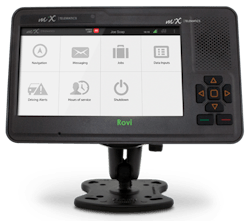ELDs: Why a bare-bones device may not be the best option
With the implementation of the electronic logging device (ELD) mandate deadline of December 18 looming in the headlights, many fleets are engaged in a “minimal compliance” strategy – investing as little as possible in ELD technology so they comply with the law. But Pete Allen, executive vice president sales for MiX Telematics North America argues in this guest column that strategy ensures ELDs will only be a “cost center” for fleets, whereas devices with more features means they could instead before a profit center for truckers large and small alike.
As we draw closer to the December 18 ELD mandate implementation date, it would be well to remember that the primary driver behind it is safety and the need to better track and enforce hours of service (HOS) rules.
In announcing the ELD final rule two years ago, the Federal Motor Carrier Safety Administration (FMCSA) predicted the devices would help reduce crashes involving large commercial motor vehicles; saving 26 lives and preventing 562 injuries annually.
The agency also stated that ELDs are expected to deliver an annual net benefit of more than $1 billion to the trucking industry – largely by reducing the amount of required paperwork.
At a minimum, ELDs need to automatically record a driver’s HOS status and drivers need to be prepared to share those records upon request during a roadside inspection.
Yet since it’s compulsory to install ELDs in your truck anyway, why not let them do more? Investing in a full-featured on-board computer will deliver improved HOS compliance, improved safety and improved efficiency – and likely the gains in the latter two will help pay for the system and more.
A MiX Telematics survey recently found that fleet management solutions help motor carriers reduce operating costs by $50 to $100 per vehicle, per month, after accounting for the cost of the system.
This shows that while a bare-bones ELD is likely to cost money, a full-featured one can actually reduce a fleet’s overall operating costs. Here’s how:
Improved compliance: ELDs help with HOS compliance by automating data capture and eliminating the errors associated with paper logs and manual back end paper processing. They can also help with IFTA compliance and fuel-tax reporting. This automated data capture not only saves a fleet time, but also reduces their exposure to fines, which in turn improves their CSA score.
Improved safety: Safety is the number one benefit of ELDs and fleet management systems, which can track not only assets but driver behavior such as rapid acceleration, harsh braking and speeding, in order to create driver scorecards and coach drivers to improve their practices. Some ELD and fleet management systems come equipped with integrated in-cab video that can provide visual evidence for accident reconstruction and insurance subrogation, and features that help eliminate distracted driving. All of this together helps reduce crashes, which in turn may help reduce a fleet’s insurance rates.
Improved efficiency: ELDs obviously eliminate paper use, and that can save truckers thousands of dollars a year alone. But they also save time on reporting through data integration, and can also help:
- Increased fuel economy though improved driver behavior, less idling)
- Optimize asset utilization.
- Reduce maintenance costs, with less wear and tear on vehicles resulting via improved driver behavior.
For a typical 100-vehicle fleet with a driver wage of $30/hour, here’s what your return on investment (ROI) might look like:
Category Savings
Compliance $65
Efficiency $56
Safety $78
Less Cost of System ($65)
Net monthly ROI $134
In deciding whether to go for a basic or full-featured system, it’s important to remember that most basic systems cannot be upgraded.So, if more functionality is required a later stage, a basic system would need to be scrapped in favor of a full-feature ELD – meaning a waste of the initial investment. Thus it makes much more sense to invest in a full-featured ELD that is not only ELD compliant, but future-proof, too.
If you’ve already decided to go beyond minimal ELD compliance, here are characteristics to look for in a platform and vendor:
- Consultative partnering approach to help fine-tune your business objectives.
- Scalable/modular platform that meets your objectives today that can expand to meet future requirements.
- Service-oriented approach with dedicated resources aligned to your business objectives to drive desired results and ROI.
- Proactive and reactive customer support.
- Contracted penalties associated with service level agreements.
- Technology with software that can be updated over the air, eliminating the need to manually update units as FMCSA requirements change.
Apart from choosing the right technology, fleets should really be looking beyond ELD compliance and choosing a vendor that can continue to offer value long after the deadline has passed. If done right, an ELD can and should pay for itself every month.


